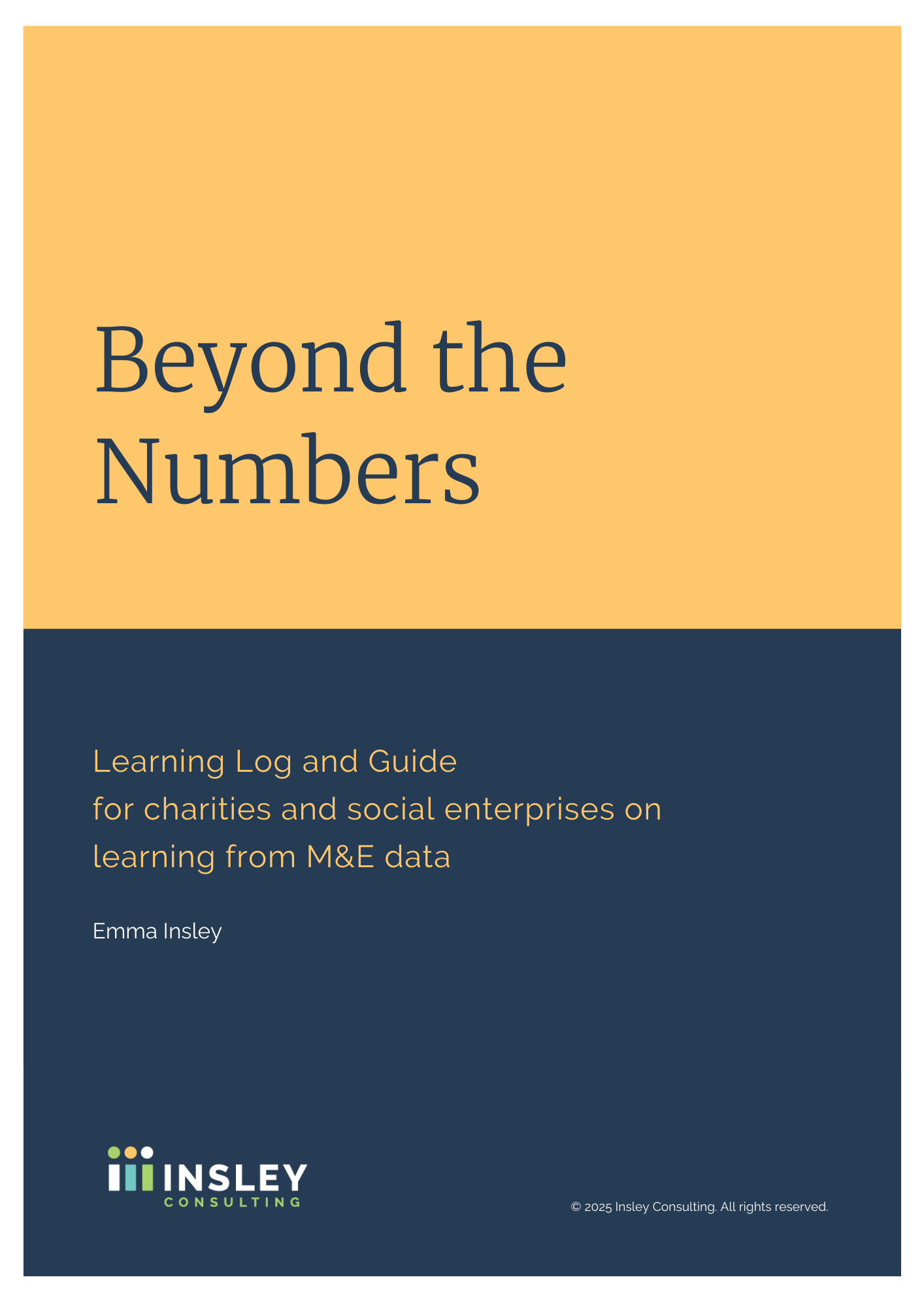INSIGHTS > ARTICLES
So you’re collecting Monitoring & Evaluation data, but are you learning from it?
Why setting aside time to reflect on your data can unlock actionable insights, improve your impact, and strengthen your funding applications.
Monitoring and Evaluation (M&E) shouldn’t be just about collecting numbers and ticking boxes. It can be a powerful tool to uncover the real story of your work – going beyond proving what has changed to understanding how change has happened and gathering clues on improving your impact. This learning process helps you make better, evidence-based decisions and adapt your services to meet the needs of your community. Importantly, it strengthens your case for funding in a fiercely competitive environment.
But all too often, organisations do a whole lot of monitoring and not enough evaluation. We understand how challenging it can be – not only to gather data but also to find the time and confidence to extract meaningful insights. Questions like “Where do we start? What should we be asking? And what do we do with these insights?” can feel overwhelming.
This is why Insley Consulting has developed a practical guide to help you learn from your M&E Data – helping you move from simply collecting data to using it as a tool for reflection, learning and improvement.
How learning from your data drives impact and improvement
Taking the time to reflect on and discuss your impact data will help you to:
- Deepen your understanding of your impact
Gain a clearer view of the outcomes you are achieving and the mechanisms of change. Mapping these causal pathways helps you to understand not just what changed but also how and why change occurred. - Identify what’s not working
Learn from areas where expected changes didn’t happen and why, which will give you clues on what you can do differently. - Involve staff and the people your organisation supports
The more participatory your learning process, the richer the insights. Engaging staff and the people you support ensures you capture both measurable outcomes and the more intangible aspects of your impact, like trust and empowerment. This means you’ll be better positioned to meet the needs of those you support and align your team around meaningful learning and improvement. - Make better decisions about your resources
Having a better understanding of where you make the biggest difference will help you channel your resources more effectively – in other words, decide what you should continue, start or stop doing. It’ll also help you spot emerging trends, address challenges proactively, and continuously refine your approach so that every piece of data serves as a stepping stone to greater impact. - Strengthen your case for funding
Large funders have long advocated for evidence-based practice and the continuous improvement of programmes. Demonstrating that you’re not only collecting data to prove outcomes but to refine and improve services shows funders that you are committed to using your resources wisely for long-lasting impact.
As Esmée Fairbairn Foundation says:
“We don’t just want to hear about your successes. We want to know when things don’t work out; why they don’t go well; and how you learn from it and use that knowledge to move forward.”
The challenges of becoming a learning organisation – and how to overcome them
The benefits of reflecting on your M&E data are clear, but we know it is not always easy. The good news is that the challenges aren’t insurmountable!
Create a safe space for learning – looking through feedback on your activities can feel uncomfortable (as it probably won’t all be positive!). Staff may feel judged or even fear for their job security.
That’s why it is vital for senior leaders to actively demonstrate that learning is about collective progress, not individual blame. Model openness and a growth mindset by acknowledging that not everything goes to plan and reframe challenges as opportunities for finding solutions together.
Make time for this reflection and sustain it – because M&E should not be an isolated task but an integral part of your organisational culture and decision-making.
Get to good enough; if setting up a half-day learning workshop feels too daunting, start by allocating time in your regular team meeting to reflect on one question you want to answer from your M&E data. Gradually dipping your toe into learning from your impact data can help to create a culture where learning becomes natural, consistent, and sustainable.
Ready to start learning from your impact data?
Becoming a learning organisation requires some bravery and commitment, but it will bring your organisation immense rewards too.
Are you ready to start learning from your M&E data? Download Insley Consulting’s practical guide – Beyond the Numbers, set aside some time to reflect individually or make time in your next team meeting agenda.
Let us know how you got on (we’re learning too)! Email me at emma@insleyconsulting.com or tag me @EmmaInsley in a LinkedIn post!

Emma Insley
FOUNDER & LEAD CONSULTANT
Emma has first-hand experience of the thrills and terrors of charity leadership. Dedicated to the non-profit sector for 30 years, Emma has both depth and breadth of experience as a CEO, Consultant, Trustee and Chair, Fundraiser and Grants Assessor.
INSIGHTS > RESOURCES

TALK TO US

